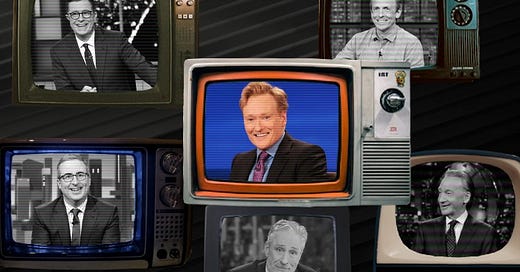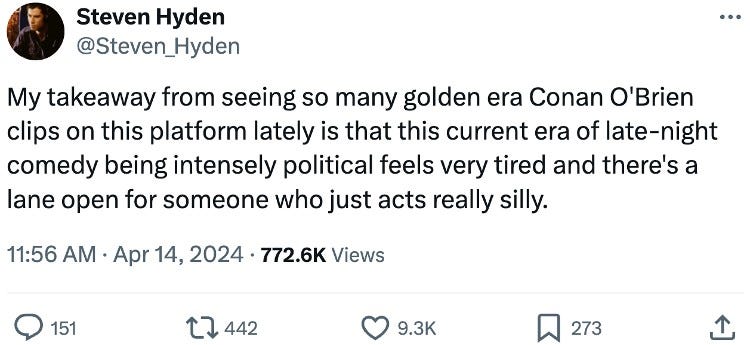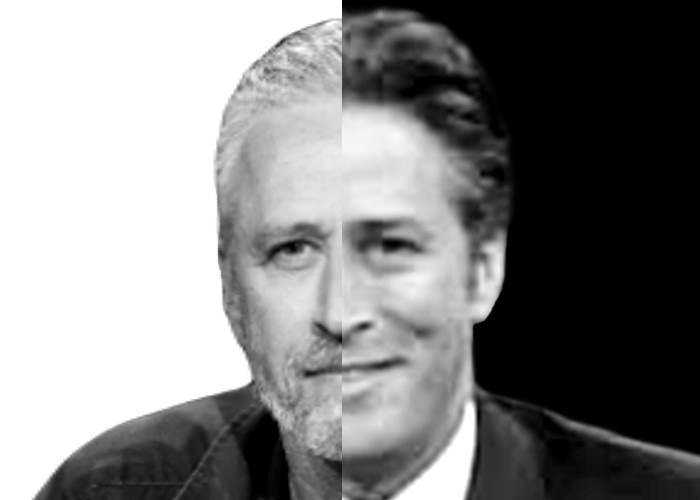Comedy Has Gotten More Political Partly Because Opinions are Easy and Jokes are Hard
Finally, a question I'm qualified to answer
Conan O’Brien has a new show coming out, which has spurred people to share their favorite Conan clips on Twitter. Of course I got in on that — you know how in tribal villages, there’s one old man who has the tribe’s entire history committed to memory? I like to think that I’m basically that, but for ‘90s comedy. I’ll also describe the joy I felt watching those clips this way: My son started walking recently, he now toddles towards me while flashing his little baby-toothed grin and saying “Da Da!”, and that gives me about the same amount of happiness that I got from watching Awesome Dave’s Counting Channel.
Many of the reactions to the Conan clips were along these lines:
He’s right, of course. There’s a lot of political comedy out there — almost certainly too much — and the next person who makes a funny, innovative show will probably get rich. So…why don’t they do that? Don’t networks like money? Shouldn’t executives be pounding on their desks and yelling “FIND ME THE NEXT MASTURBATING BEAR!!! I WANT A SCRIPT ON MY DESK ABOUT A PANDA WHO ENJOYS ANAL PLAY BY MONDAY MORNING — NO EXCUSES!!!”
The reasons why networks can’t or won’t make a Conan-style show are many and varied. I’ve written a lot about how comedy has changed, and I’ll probably write more. But because I’m so definitively in the political/comedy space,1 I can say something that non-political-comedians are usually too polite to say: Writing jokes is a lot harder than writing opinions. And one reason why there’s a lot of political comedy out there is that it’s simply easier.
Political comedy has been my full-time job for a decade. I’ve had lot of time to think about what hits, what doesn’t, and why. I find there are basically two things that people respond to. One is humor — some of my most popular pieces are goofy things that are barely political at all. And the other thing that people like is — you’ll love how obnoxiously pretentious this is — a statement. Generously interpreted, “a statement” means “a trenchant analysis of important matters.” Less-generously interpreted, it means “some shit people agree with.” But probably the most accurate interpretation is: “a cynical regurgitation of your audience’s beliefs that flatters their self-image, which creates a fucked-up relationship based on mutual puffery that — somehow, some way — ends in you getting money.”
Statements are easy, but comedy is hard. Coming up with a joke is a like fishing: No matter how good you are at it, sometimes you reel one in and other times you don’t. For example: I would loved to have come up with a better simile in the preceding sentence than fishing. Don’t think I didn’t try — I chewed on it for an hour. At one point, I was close to going with “jokes are like getting struck by lightning”, but that sucks, and at another point it was “jokes are like finding the really specific kind of porn you like,” but that’s just me trying to save a bland premise by going blue. So…fishing it is. Decent as a metaphor, but barely even a joke. Writing jokes is hard, folks. As hard as Bill Clinton after a handful of Viagra!!! (I’m going to break for lunch now and try to come back strong this afternoon.)
Like any middle-aged man, I can rattle off opinions all day and night. Here are eleven off the top of my head:
It’s time for non-Greek yogurt to make a comeback
The idea of Italy is better than the reality
Obama’s going to show up in October like Willis Reed in game seven of the 1970 NBA finals and win this election for Biden
Oppenheimer wasn’t good
I would have been a much worse husband and father in the pre-DVR era
Low-sodium soup is a perverted farse
Iran’s government can be explained by the fact that a country’s worst people are usually also the ones most willing to use force
Sonia Sotomayor should retire
All music sucks now
If you’ve got a scented candle, you’re 2/3 of the way to a pleasant evening
Yoshi and Dave Grohl are similar figures2
And I’ve got more opinions where those came from! There are barely any limits to my ability to run my fool mouth on matters great and small. It is truly a blessing to work in a field in which that major personality flaw can be used to earn a living.
And there’s more good news for people in this field: If you know your audience’s views in advance, your opinions don’t even have to be original! You can functionally stop writing altogether — you can just compile the views that your audience wants to hear. If cable news has taught us anything, it’s that there’s a market for partisan talking points presented as analysis. If you can pepper those talking points with the occasional zinger, then nifty (though in many cases, the jokes are parsley and the worldview-affirming opinions are the steak). Tribalism works well on social media, too: If you tweet a popular opinion, people will “like” it just so that they don’t look like an asshole. Algorithms still can’t differentiate between “liked because the person genuinely liked it” and “liked because the person didn’t want their friends to think that they have the wrong opinion on Israel.” And that ambiguity can be used to drive a comedian’s engagement metrics.
Plus, people sometimes give you awards for writing political stuff. It’s not enough for people in entertainment to be rich, admired, and so powerful that they can lawyer their way out of a felony or two: They also have to feel that what they do is important. So, they often give awards to shows that are capital-i Important even if they aren’t capital-g Good. Once again: Non-political comedians can’t say this, because if they do, it sounds like sour grapes. But I can say it because the Emmys that probably should have gone to Conan and his staff are currently sitting in my closet; I won them for pieces including Trump Is Bad and Let’s Shake Our Fists At Some Rich Guy.
So, why is nobody doing Conan-style comedy? Largely because Conan-style comedy is really hard. Take it from me: In political comedy, the “comedy” is the hard part. Next time you read something I write that’s commentary-heavy and joke-light, don’t think “what a searing analysis” — think “I guess the giggle trout weren’t bitin’ at the ol’ joke pond today.” And yes: I just called back a joke that I wasn’t nuts about in the first place. Jokes are hard, people! And that’s why sometimes, you get politics instead.
If you don’t know my background: For about a decade, I was a speechwriter in DC by day and a standup comic by night. From 2014-2020 I wrote for Last Week Tonight with John Oliver, and I wrote for American Auto on NBC after that. And now I write this political comedy blog.
In the early ‘90s, both were part of popular things but not the main guy. Both distinguished themselves, and both went on to have long careers doing things that we didn’t initially know they could go (e.g. playing guitar, driving a go-kart).









Another reason it's hard for modern comedians to attain the dizzying heights of glorious silliness reached by Late Night with Conan or its Letterman predecessor is because with the passage of time we remember the memorable bits and forget the rest. Those shows cranked out a ton of comedy five nights a week for years, and while we can credit the wild anarchic glee of its creators for the stuff that hit, we should also credit the sheer desperation of constant deadline pressure. And the show-biz rule, best exemplified by punk rock, that if "unpolished" is the best you can manage on the production schedule and budget you have, present it as a stylistic choice.
Stephen Colbert's in-character performance at the 2006 Correspondent's Dinner was a thing of beauty, because it was at a time and place where it felt like comedians were the only people who could get away with criticizing the Bush administration. It was a brave move and a logical extension of Colbert's clueless conservative persona. But after it got a great response, subsequent attempts to capitalize on the "court jester who is the only one allowed to speak truth to power" persona didn't feel so risky anymore.
Eventually the schtick ossified into the rote clapter-farming affair it is today.
Craig Ferguson left the “silly and fun” lane wide open and it’s been empty ever since.